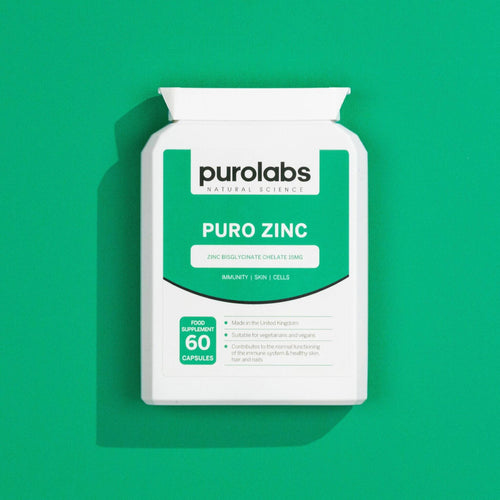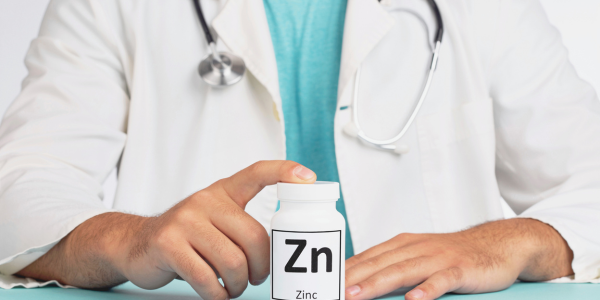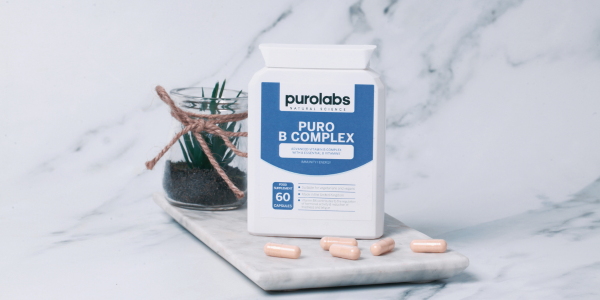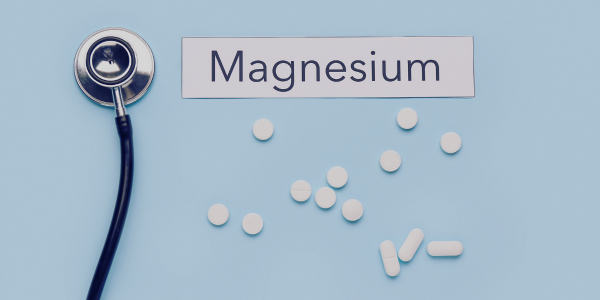So…what is Zinc?
Zinc is an essential mineral. In fact, it is the second-most abundant trace mineral in the human body after iron and can be found in every single cell. As zinc is a trace mineral, it means that our body cannot produce or store it, however the mineral can be found in a range of animal and plant sources as well as supplements.
Dietary rich sources of zinc include:
- Oysters
- Crab
- Pumpkin seeds
- Red meat
- Chickpeas and legumes
- Eggs
- Nuts & seeds
Recommended Intakes
The government recommended daily intake of zinc varies between the sexes, with the recommended daily intake set to 9.5mg for men and 7mg for women1.
If you are a shellfish lover, then you are in luck. Shellfish contains abundant bioavailable i.e. highly absorbable form of zinc. A 100g serving of oysters, depending on the type and variety contains 16-182mg of zinc. Plant food sources aren’t as abundant in zinc, although do contain sources of the key mineral.
Cashews, which are considered a source of dietary plant-zinc contain 3mg zinc per 50g serving, whilst 100g chickpeas contain 1.5mg.
The recommended intakes consider adequate intakes to support a healthy population, however if you are experiencing any health symptoms which are related to the following topics; a concentrated therapeutic dose as provided in our zinc supplement may be recommended.
Read on to discover the many benefits of zinc, and why it should be at the top of your list for overall health and longevity…
Boosts Fertility
Zinc is a vital nutrient that should be at the top of supplement recommendations when it comes to supporting both male and female fertility.
Sadly, infertility is on the rise, with the World Health Organisation publishing findings which have highlighted a trend towards increasing infertility in both sexes2. My clinical considerations when supporting couples’ fertility is to support both partners to boost the chances of successful conception.
Whilst conception is a consideration when it comes to fertility, fertility in reproductive years is a sign of good general health, therefore boosting fertility is also an important consideration for those who aren’t focused on reproduction.
Zinc is one of the most important nutrients when it comes to sperm production, maturity, mobility and count. Zinc deficiency is associated with low testosterone levels which affects sperm quality, libido and conditions such as erectile dysfunction3,4.
For women, zinc is needed for the development and function of the female reproductive system, which includes ovulation and menstrual cycle regulation along with egg maturation. Zinc has even been shown to positively affect conditions which affect female health and fertility like polycystic ovary syndrome due to its effects on blood sugar and lipid balance5.
Co-factor for Many Bodily Processes
Zinc is a cofactor for approximately 300 enzymes in the body!
Whilst this statement, at first glance, may not mean much, what it shows is that hundreds of chemical processes in the body that are required for general function need zinc to help facilitate them.
Zinc is a cofactor (i.e. supporting nutrient) to help6:
- Make proteins
- Create and maintain healthy functioning DNA
- Support efficient energy production
- Assist in methylation (which helps to control gene expression essentially supporting overall health and protecting against inflammation and disease) 7
- Break down and detoxify alcohol and other inflammatory chemicals
May Help to Reduce Acne
Zinc is a key co-factor nutrient for vitamin A absorption and utilisation.
Vitamin A is the skin nutrient of all skin nutrients and is a popular ingredient in acne-fighting and antiaging skincare as it helps to boost skin turnover to repair skin cells. As zinc helps to boost vitamin A absorption, it helps to make vitamin A supplementation more effective when supporting general skin health.
It is also important to note that zincs anti-inflammatory properties also make it a key nutrient consideration for other inflammatory skin conditions like eczema, dermatitis and psoriasis.
Supports the Immune System
One of zincs most well-known roles on human health is its immune-boosting properties.
Zinc impacts many parts of the immune system including innate immunity, i.e. supporting the development of immune cells. Macrophages, which are cells used for tissue repair and activated for their antimicrobial properties, are less effective if the host has a zinc deficiency.
Zinc deficiency also hinders the production of T & B cells, which studies have linked to a higher risk factor for cancers and infections8.
A Potent Antioxidant
As mentioned, zinc contains anti-inflammatory properties which defines the mineral as such an important nutrient for overall health and wellbeing.
As an antioxidant, zinc helps to scavenge and remove inflammatory free radicals, which are produced as a result of internal and environmental wear and tear. This is ever increasingly important to become aware of as we begin to age, as our bodily defences to inflammatory elements decrease.
Helps Support Early Years Development
During pregnancy, infancy and childhood, zinc is incredibly important to help with growth and cell maturation. Zinc is important for cellular growth, differentiation and zinc deficiency may result in stunted physical growth. Zinc deficiency in early years is also associated with impaired immunity and thyroid function.
Zinc also helps with neuronal (brain) activity, helping to contribute to brain development which is crucial in early years to support healthy brain formation throughout life10.
Can Support Gut Health
Along with B12 and B6, zinc helps to support our gut lining integrity. Healthy zinc levels helps with intestinal barrier health and helps the gut to absorb other vital nutrients.
Healthy zinc levels also help to regulate our microbiome health, and zinc deficiency has been shown to impact bowel function causing diarrhoea and inflammation within the gut11.
Consider Supplementation if You Eat a Plant-Based Diet
Whilst it is entirely possible to consume enough zinc on a vegetarian diet with the inclusion of shellfish, it is quite a bit harder to obtain adequate zinc through a vegan diet.
Pumpkin seeds, which contain one of the highest plant-food sources of zinc contain 2.5mg of zinc per 30g serving. This is around a third of the daily requirements for women and approximately a quarter of the daily requirements for men.
It is also important to mention that if you have a health condition related to any of the topics discussed in this blog article, I recommend that you increase intake to above the government recommended (with the help of a qualified health professional).
If you consume a predominantly plant-based diet or you are vegan, then I would consider zinc supplementation to ensure that you are ingesting a therapeutic effective dose of daily zinc to meet your health needs.






















